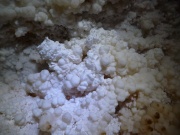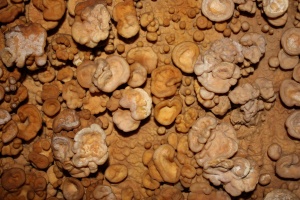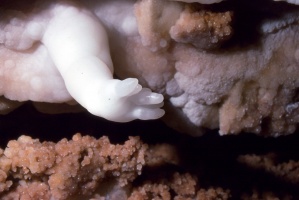Calcite (Inventory)/Popcorn
From LagWiki
(Incorporate the new image) |
|||
| Line 4: | Line 4: | ||
Cave popcorn are small balls of calcite, aragonite and more rarely gypsum which project from surfaces such as bedrock and other speleothems. They usually appear in clusters but can rarely occur singularly. Dense growths of popcorn that terminate downwardly are known as [[Calcite (Inventory)/Tray|trays]]. Popcorn can form almost anywhere and comes in a few varieties including button popcorn which has flattened nodules. Any observation of popcorn no matter its composition should be recorded here. Popcorn nodules may be smooth like flowstone or chalky and round like edible popcorn. They may be decorated with [[Aragonite (Inventory)/Frostwork|frostwork]] and may appear only on one side of speleothems, usually the windward side. The clusters may terminate abruptly in a stratographic layer in either an upward or downward direction. The size of each individual nodule can vary from tiny to small but usually does not grow much bigger than an inch or so. The color is usually white but various other colors are possible, too. | Cave popcorn are small balls of calcite, aragonite and more rarely gypsum which project from surfaces such as bedrock and other speleothems. They usually appear in clusters but can rarely occur singularly. Dense growths of popcorn that terminate downwardly are known as [[Calcite (Inventory)/Tray|trays]]. Popcorn can form almost anywhere and comes in a few varieties including button popcorn which has flattened nodules. Any observation of popcorn no matter its composition should be recorded here. Popcorn nodules may be smooth like flowstone or chalky and round like edible popcorn. They may be decorated with [[Aragonite (Inventory)/Frostwork|frostwork]] and may appear only on one side of speleothems, usually the windward side. The clusters may terminate abruptly in a stratographic layer in either an upward or downward direction. The size of each individual nodule can vary from tiny to small but usually does not grow much bigger than an inch or so. The color is usually white but various other colors are possible, too. | ||
| - | <gallery caption="Gallery" widths=300px heights=200px> | + | <gallery caption="Gallery" perrow=1 widths=300px heights=200px> |
File:Button popcorn.JPG|Button popcorn | File:Button popcorn.JPG|Button popcorn | ||
File:Finger Coral.jpg|Singularly unusual popcorn nodule | File:Finger Coral.jpg|Singularly unusual popcorn nodule | ||
Revision as of 05:16, 25 July 2013
The Popcorn field of the Calcite section should be used to record stations where cave popcorn is found.
Cave popcorn are small balls of calcite, aragonite and more rarely gypsum which project from surfaces such as bedrock and other speleothems. They usually appear in clusters but can rarely occur singularly. Dense growths of popcorn that terminate downwardly are known as trays. Popcorn can form almost anywhere and comes in a few varieties including button popcorn which has flattened nodules. Any observation of popcorn no matter its composition should be recorded here. Popcorn nodules may be smooth like flowstone or chalky and round like edible popcorn. They may be decorated with frostwork and may appear only on one side of speleothems, usually the windward side. The clusters may terminate abruptly in a stratographic layer in either an upward or downward direction. The size of each individual nodule can vary from tiny to small but usually does not grow much bigger than an inch or so. The color is usually white but various other colors are possible, too.
See also
References
- Palmer, Arthur N. (2007) Cave Geology CAVE BOOKS, Dayton, OH p 288 ISBN-13: 978-0-939748-66-2, ISBN-10: 0-939748-66-5
- Hill, Carol; Paolo Forti (1997) Cave Minerals of the World (Second Edition ed.) National Speleological Society pp 59-61 ISBN: 1-879961-07-5



